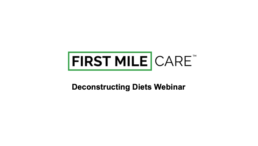By Kathy Gregory, First Mile Care DPP Coach
A core component of the National Diabetes Prevention Program (DPP) is learning to eat well and develop new healthy lifestyle habits to reverse prediabetes. As part of the First Mile Care “Diabetes Prevention in Action” webinar series, I looked at the pros, cons, and commonalities of several popular diets.
It’s important to understand that diet, weight loss and healthy eating are linked, but not interchangeable. People invest a lot of time (and money) in searching for a magic weight loss formula, but diets are definitely not one-size-fits-all. If you fail to stick to the guidelines, you may feel guilty and become discouraged, even though we all have different motivational triggers. What is successful for one person may be really challenging for someone else. When you’re fixated on weight loss, rather than on adding quality ingredients and calories to promote wellness, you’re more likely to develop an unhealthy relationship with food.
Let’s look at five of the most popular diets today.
- Keto Diet — This diet requires detailed food tracking to adhere to recommended percentages. The focus is on healthy fat for about 75% of your daily calories, 20% protein intake, and no more than 5% carbohydrates. Due to the high fat and protein intake, you may feel fuller for longer. However, because it’s very low in fibrous foods such as fruits, vegetables, and whole grains, it can result in nutrient deficiency and constipation.
- Paleo Diet — This diet emulates the dietary pattern of our ancestors by emphasizing fresh foods and avoiding processed foods. It promotes the intake of healthy fats, vitamins, and minerals from fresh foods but excludes legumes, dairy, and grains, so some people may not absorb enough fiber, calcium, or vitamin D.
- Whole30 Diet — An elimination diet that requires you to cut out grains, dairy, legumes, alcohol, and added sugars and sweeteners from your diet for 30 days, mainly to help you identify food sensitivities or allergies. While it does not focus on calorie count, you may miss out on some important nutrients. It can be so restrictive that you may find it difficult to maintain without a medical reason.
- Intermittent Fasting (IMF) Diet — The 16:8 is the most common IMF diet, where you’re encouraged to eat more fruits, vegetables and other health-promoting foods but only during an eight-hour period, while fasting during the other 16 hours. While it eliminates all-day grazing, it is very restrictive and can lead to bingeing during eating windows. Also, as your body adapts to “starvation” periods, it will begin to burn fewer calories as it senses you may not be getting enough nutrients.
- Mediterranean Diet — This follows the food traditions of many Mediterranean countries by focusing on olive oil, vegetables, fruits, nuts and seeds, beans, whole grains, and some dairy products. It is low in saturated fats and fairly easy to follow as it is not particularly restrictive, although it requires the availability of fresh ingredients to prepare meals at home.
Commonalities
These diets all advocate eating fresh, whole foods — meaning, foods that are not processed. Whole foods are fruits, vegetables, lean proteins, dairy — not something you buy in a box or package. (Pro tip: When you go to the grocery store, try to spend the majority of time shopping in the perimeters where you’ll find whole foods, or in farmer’s markets to get what’s in season.)
Another commonality among several of these diets is restriction. Yet that can be their downfall as restriction generally does not work over time because we run out of willpower. The more complicated and restrictive a diet, the harder it becomes to adhere to it over time.
Eating for health
The DPP emphasizes eating for health, not short-term weight loss. But weight loss IS a natural side effect of eating for health; it just takes time to achieve. At First Mile Care, we recommend DPP participants follow these guidelines:
- Eat whole food – fresh vegetables should be about 50% of your plate, lean protein about 25%, and starchy vegetables or whole grains 25%
- Cook at home so you can control ingredients, calorie quality, and portion sizes
- Exercise daily (at least 150 minutes per week)
- Manage your stress load
- Get adequate and quality sleep
- Stay properly hydrated with water and not sugary drinks
Good health results from consistent behaviors. Making lifestyle changes that endure can be a slow process, but a rewarding one that pays big dividends.
Watch the video below for my full presentation on diets, healthy eating, and their link to diabetes prevention.
To learn more about how you can benefit from the First Mile Care Diabetes Prevention Program, take the prediabetes risk test and get started today!




